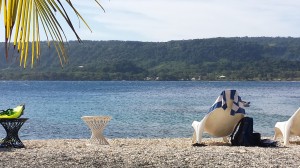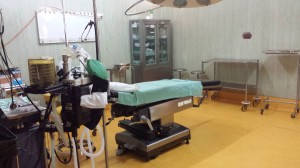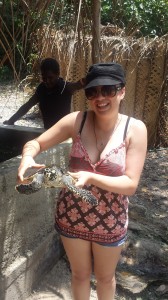Having done very little travel, I was amazed to find out that culture shock is not the myth I believed it to be. No amount of planning or research could have prepared me for just how out of depth I would feel when I arrived here in Vanuatu. Most everything I’ve seen and heard since I got here has been so different to my version of ‘the norm’ that I couldn’t help but miss home like crazy at first. Thankfully, after a week of sunshine and friendly locals, I feel more at home here and am looking forward to the next five weeks.
Now I’m not ashamed (that’s a huge lie – I’m very ashamed) to admit that I’m a bit of a princess – the two cockroaches I found in my room would attest to that if they were still around to tell the tale. So why, you may ask, would I willingly come to a place that I knew was not suited to my high-maintenance needs?
Well there were a multitude of reasons, but the most important of these was that I wanted to experience medicine in a place with limited resources and I’d heard great things about the teaching here. So with reservations I applied to spend time at Vila Central Hospital on Vanuata and resolved to become low-maintenance for a while. The best experiences usually come from going out of your comfort zone right?
So a bit about Vanuatu and its healthcare system; this is a country made up of around 82 islands, grouped together into different provinces, and with a combined population of around 270,000. The people here mainly speak Bislama, but French and English are also spoken. Port Vila, the country’s capital is situated on the largest island of Efate in Shefa Province.Primary health care is provided by nurse run clinics in the various villages on each island, with a poorly coordinated referral system to the major hospitals in Luganville (on the island of Espiritu Santo) and Port Vila. Vila Central Hospital is the larger of these two hospitals and has maternity, paediatric, surgical and medical wards as well as its outpatient and emergency services. The last two of these are housed in a newly opened building where the laboratory and radiology department are also contained. There are also two new theatres in this building which will open early next year to supplement the two the hospital already has.
The number of doctors can vary at any one time, depending on who is away training overseas or on leave. This week I was placed in the surgical ward where currently there were two surgeons, a registrar and four nurses covering around 30 inpatients. The surgeons would operate four mornings a week (the other morning was for Gynae procedures) and then run an outpatient clinic each afternoon. The registrar would do most of his work on the ward, doing rounds in the morning and paperwork until around lunchtime.
The surgical ward was especially busy this week with all elective surgeries being stopped from 1 December and not recommencing until the 19 January 2015. Many patients were in a holding pattern – unable to go home because they were too unwell, but unable to have their operation because the lists were full or there was not enough donated blood available.
Friday’s ward round was particularly difficult as many patients were told that they were being sent home and would not receive their operation until late January. Communicating this to patients takes time, and this isn’t always taken. One patient in particular was so confused a nurse had to stay behind and clarify things for him.
Communication between doctors and patients can be difficult; patients often nod and agree with the doctor, although they often don’t understand what is being said. I’ve found myself wishing I could speak Bislama many times this week just so I could try and explain things better to these patients.Perhaps a great example of this is a patient who had already been on the ward for a couple of weeks when I arrived. The patient suffers from epilepsy and had happened to have a seizure whilst holding a large pot of boiling water. The majority of this spilled all over the right hand and the patient sustained severe burns over the fingers as well as the back of the hand and forearm. It was unclear as to whether or not the patient had come to hospital straight away (it is very rare for people here to seek help from a doctor immediately) but at some point an infection developed which needed debridement. The infection kept recurring and gradually more and more tissue was lost from the hand.
When I met the patient on Monday, the infection was so bad you could see the bones of all four fingers and the joint spaces between each phalanx. It was clear that this patient was going to lose these fingers and the surgeon was keen to amputate to prevent things from getting worse. The was little explanation given for why an amputation was necessary, just the statement that it had to happen followed by a shrug of the shoulders when the patient said no. The patient refused amputation and the surgeon moved on to the next patient.
I felt helpless as I watched the same thing happen the next two days as well. Eventually we got the patient to agree to amputation but, when we got here to theatre, it was discovered that there was only consent for another debridement. This meant the patient would now have to wait until Tuesday for the amputation as Monday is a public holiday. I can’t tell you how frustrating it was for me to watch the surgeon perform a debridement knowing that this patient was going to lose more than just fingers because of this paper error.Despite all this, I really enjoyed my time on the surgical ward. It was amazing to see some of the pathology that arises here and how easy it is to take things for granted (like CT scanners or chemotherapy for instance). Hopefully I will have an equally enjoyable experience in the Maternity ward next week.




2 Comments to 'Culture shock and communication issues'
December 3, 2014
wel done bud sounds like you are enjoying it look forward to your next report
December 7, 2014
Just realised I’ve made a mistake – Efate is actually Vanuatu’s third largest island!
Leave a comment